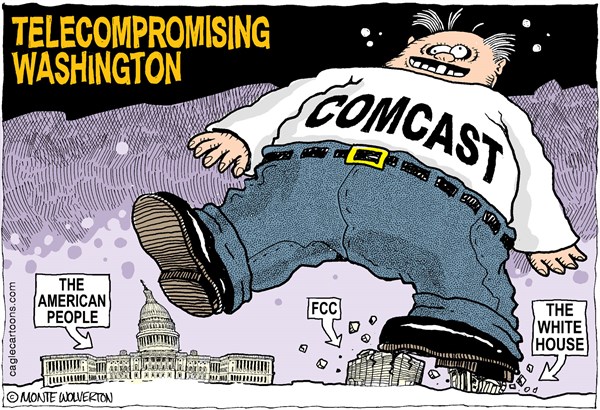(Ed. Note: Our formal written submission to the New York Public Service Commission is presented in this series of articles. Please note that any graphics included on Stopthecap.com were not included in the formal filing, but are presented here to make the material more reader-friendly. — PMD)

STATE OF NEW YORK
PUBLIC SERVICE COMMISSION
Joint Petition of Time Warner Cable Inc. and
Comcast Corporation For Approval of a Case 14-M-0183
Holding Company Level Transfer of Control.
Statement of Opposition to Joint Petition
Phillip M. Dampier, Director and Founder: Stop the Cap!
Rochester, New York
August 1, 2014
Stop the Cap! is a not-for-profit group founded in Rochester in 2008 to fight against the introduction of artificial limits on broadband usage (usage caps, consumption billing, speed throttling) and for better broadband speeds and service for consumers. Our group does not solicit or accept funding from lobbyists, companies, or others affiliated with the telecommunications industry. We are entirely supported by individual donors who share our views.

Regulators cannot outsmart multi-billion dollar corporate giants with temporary merger mitigation strategies that end up not helping consumers for very long, if it all.
Introduction
Our opposition to the Joint Petition is based on our belief it does not meet the “public interest” test established in Section 222 of the New York Public Service law, and must therefore be denied.
We are concerned the Commission may attempt a mitigation of Comcast’s failure to demonstrate a public interest benefit for New York residents in its application. The Commission may even attempt to negotiate a monetary public benefit adjustment to afford Comcast the opportunity to pay its way to approval of a merger the overwhelming majority of New Yorkers who have shared their views with the Commission ardently oppose. We submit that the recent change in New York law obligates the applicant alone to demonstrate its proposal is in the public interest. It is not the Commission’s responsibility to propose mitigation formulas that tip the balance in favor of an applicant.
Also lacking in the discussion is a careful analysis and comparison of Time Warner Cable’s existing products and services in contrast with Comcast and, more importantly, the impact of its own upgrade program now underway. It is our contention New York will be better served by retaining Time Warner Cable as the dominant cable provider and rejecting Comcast’s attempt to transfer Time Warner’s franchise agreements to itself. We are not opposed to Comcast independently entering New York and competing head-to-head with Time Warner Cable, although we believe it is unlikely.
Ultimately, we believe Comcast’s executive vice-president David Cohen made one of the strongest arguments why this merger simply does not make sense for New York:
“We are certainly not promising that customer bills will go down or increase less rapidly.”[1]
—
[1]https://arstechnica.com/tech-policy/2014/02/comcast-no-promise-that-prices-will-go-down-or-even-increase-less-rapidly/


 Subscribe
Subscribe